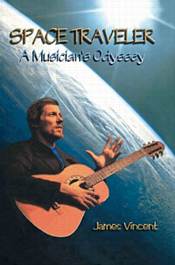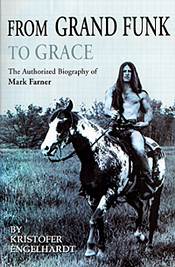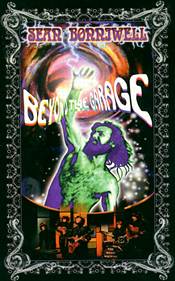• James Vincent: Space Traveler – A Musician’s Odyssey, iUniverse Publishing, 2003

Photo credit: BRJ Music
At almost 300 pages, James Vincent’s autobiography, Space Traveler, is a brisk-paced walk through a remarkable life. Sharing concert stages with the likes of Carlos Santana, Mike Bloomfield, Jerry Garcia and other luminaries, Vincent experienced more than your average highs and lows – both professionally and personally.
Raised in Chicago, his first road trip — while still in his teens — saw him rubbing shoulders with the Hawks in Toronto in the late 1950s, long before they changed their name and attained legendary status as the Band. In 1962 he performed at the infamous Peppermint Lounge in New York City — and its L.A. offshoot — when the Twist craze broke. Later he played in a number of bands that almost made the big time, including Aorta, Rotary Connection, Coven, and after moving to the west coast, Azteca, H.P.Lovecraft, and Howard Wales and Hooteroll.
Music business anecdotes alone would be enough to warrant this book, but Vincent’s spiritual journey is equally fascinating. He flirted with a bevy of belief systems and practices, including Witchcraft, the Mind Sciences (Unity Church), Carlos Castaneda and Indian Shamanism, Metaphysics, the Occult, and the then prevalent drug culture.
 It’s more than one hundred pages before he embraces Christianity, and his immediate and absolute rejection of his former worldly lifestyle is dramatic and perhaps a tad naïve. Offered membership in the enormously popular band Chicago — which included a guaranteed $1,000,000 annually before factoring in record sales, publishing and concert income — he declined due to his refusal to work on the Sabbath. Years later, under very different circumstances, he unsuccessfully auditioned with the same group for a salaried position.
It’s more than one hundred pages before he embraces Christianity, and his immediate and absolute rejection of his former worldly lifestyle is dramatic and perhaps a tad naïve. Offered membership in the enormously popular band Chicago — which included a guaranteed $1,000,000 annually before factoring in record sales, publishing and concert income — he declined due to his refusal to work on the Sabbath. Years later, under very different circumstances, he unsuccessfully auditioned with the same group for a salaried position.
In 1975 his solo debut, Space Traveler, was released on Columbia Records to positive reviews, and garnered enough interest to warrant a follow-up. In the meantime, Vincent’s newfound faith had a profound impact. Waiting For the Rain, released in 1978, was a powerful statement of faith, released a full year before Bob Dylan’s Slow Train Coming, and was arguably the first Christian rock album released to the general listening audience on a secular label.
On the first day of a promo tour, he scared off a San Francisco jazz radio DJ by proclaiming the blood of Christ during a live on-air interview, and the subsequent tour was quickly cancelled. To the relief of both parties, he was pretty much abandoned by the label once they realized what they were dealing with. Taking this as a sign, he left music behind, taking on a series of odd jobs. Wooed back to recording in 1980 by Sparrow Records — a giant in the Christian music business — Vincent earned more money than he had in his secular career. But he found this side of the business even more offensive, writing:
“As the time progressed, I was coming under the conviction that I was in the midst of an unwholesome industry. It may have started out with noble intentions, but it had become mercenary … like the moneychangers that sold animals for sacrifice outside the temple grounds.”
When I spoke with Vincent last month, he said he considers the current Christian music scene to be even more corrupt: “I am sure that there are noble intentions put forth by some of the artists that start out today, but the erosion of principles is almost always inevitable once the adulation begins. The Christian music industry today is in a far worse condition than in 1980 — in that the music is hard to differentiate from the world’s music, and is often controlled and marketed by unbelievers. ‘Be ye not unequally yoked.'” Vincent — who limits his own listening to classical and symphonic works — holds strong views regarding the role of music in our lives: “It often serves as a distraction to prevent us from hearing that ‘still small voice’ in a world that is nearing its final hour. God’s people, myself included, need to turn off the noise and hear His voice only. God is preparing a people that will perfectly reflect Christ’s righteous character here on earth, and they will shun the sounds of the world, and hear His voice only. Such a people are written of in the book of Revelation. Music in it’s purest form should take the listener to heavenly places. Sadly such a music is hard to find.” As his book recounts, he has repeatedly landed on his feet financially. After leaving the music business in the 1980s, he made even more as a Herbalife distributor. Ventures into television advertising, multi-level marketing, and a stint as a car salesmen saw him earning — and spending — money with almost reckless abandon.
Over the years, Vincent has run the gamut of behaviours: from a man of God, putting his faith and family before all else, to absolutely irresponsible, leaving himself and those closest to him in precarious positions. Whole-heartedly embracing either the sacred or the profane, he has repeated dysfunctional patterns with a variety of women.
Now on his fifth marriage (he labels himself a “serial adulterer”), Vincent, with brutal honesty, shares his long walk with God. To his credit, he never justifies his more questionable exploits, instead seemingly as shocked as the reader. That he finally appears to have peace makes for a satisfying end to an intriguing and entertaining read.
• James Vincent: Space Traveler, BRJ Records, 1975.
In 1972, while performing with Howard Wales and Jerry Garcia, Vincent was blown away by the tour’s opening act, the Mahavishnu Orchestra, which featured guitarist extraordinaire John McLaughlin. McLaughlin’s playing had a huge impact on Vincent’s already formidable style, and it’s easy to hear that influence on Space Traveler. Jazz/rock fusion with R&B elements, it has funky grooves supplied by a trio of top drummers, including Harvey Mason, (George Benson/Herbie Hancock), Clyde Stubblefield (James Brown), and Freddy White (Earth Wind & Fire) plus Leon “Ndugu’ Chancler (Miles Davis/Santana/Michael Jackson) adding extra percussion. The album is further enhanced by string and horn arrangements from the legendary Jack Nitzsche. The title track recently appeared on Abstract Funk Theory, a British compilation of obscure gems; but for fans of the genre, the entire album is well worth seeking out.
• James Vincent: Waiting For the Rain, BRJ Records, 1978.
Waiting For the Rain, like Space Traveler, was originally released on Caribou/Columbia, and looked poised to bring greater success. Musically, the fusion elements remain, but the lyrical stance is radically different, dealing exclusively with his newfound faith. While it’s easy to blame the album’s commercial failure on the lyrical content, it’s not necessarily the case. At the time, it was quite common for fusion acts to reflect their faiths: Chick Corea and Return To Forever, while chiefly instrumental, occasionally sang songs inspired by L. Ron Hubbard and Scientology; Santana, as well as McLaughlin’s Mahavishnu Orchestra, offered paeans to Indian guru Sri Chimnoy. More plausible is the fact that the album, having received almost no promotion or follow-up tour, was destined for cult status regardless of it’s quality.
• James Vincent: Enter In, BRJ Records, 1980.
Released on Sparrow in 1982, Enter In is the only album James released directly into the Christian market. The feel is consistent with the earlier releases, and the lyrics — like Waiting — are completely concerned with his faith. The sounds are dated, more so than on previous efforts, with plucked basses and disco-style drums spoiling some of the tracks. Vincent’s own playing is as impressive as ever.
• James Vincent: Pure Satisfaction, BRJ Records, 2001.
Pure Satisfaction is a return to Christian themes after a 20-year break. Overall the disc is less aggressive, with a decidedly mellow bent. Two decades on, Vincent remains in fine shape vocally; but a modest budget is apparent throughout, particularly in the string and horn sounds, which are synthesizer-generated rather than the real thing.
• James Vincent: Mystery Of Love, BRJ Records, 2002.
Mystery of Love is laid back, mellow fusion, in George Benson/Boz Scaggs/Chick Corea territory. Excellent playing, evenly divided between instrumentals and vocal tracks. Lyrics are more adventurous, exploring the love between a husband and wife. An excellent introduction to where Vincent is at today.
 • Kristofer Engelhardt: From Grand Funk to Grace, the Authorized Biography of Mark Farner, Collector’s Guide Publishing Inc., 2001.
• Kristofer Engelhardt: From Grand Funk to Grace, the Authorized Biography of Mark Farner, Collector’s Guide Publishing Inc., 2001.
As leader of Grand Funk Railroad, Mark Farner experienced success on a level rare even in the entertainment industry. The group broke numerous attendance and sales records, including being the only act besides the Beatles to sell out Shea Stadium in New York City – and they did it faster than the Beatles – a record that still stands more than 30 years later. Music critics despised their brand of no frills rock, but the public ate it up.
While they fancied themselves the “people’s band,’ they were at the mercy of their manager — who earned far more than the band members. In 1972 the trio, who were bringing in as much as $60,000 a show while living on a weekly wage of $350, discovered they were flat broke. In fact, they owed $400,000 to the I.R.S. Their manager offered to arrange a loan – providing they extended his contract another three years. A nasty court battle ensued. At one point the now ex-manager took the rights to the name Grand Funk, effectively keeping the group from performing in public.
In the end they went on to even bigger sales, with hits like “We’re An American Band’ and “The Loco-Motion,’ both of which hit #1. But the newfound success was short-lived. By 1976, with the advent of the disco era, the band appeared out of step, and Farner left, embarking on a less successful solo career.
In 1983, despondent after splitting with his second wife, he came back to the faith he had as a child. Concurrently — and unbeknownst to him — that very same week his wife also accepted Christ. They reunited, and began to take their faith seriously. Soon after, he was offered a solo deal with Columbia Records, but rejected the deal and fired his manager, resolving to surround himself with like-minded believers.
He began recording for a Christian record label; but much like James Vincent, discovered that it was in many aspects a negative experience, enough for him to eventually leave the scene — but not his faith — altogether. When I spoke with Farner a few years back about his time in the CCM scene, he shared his feelings that the ‘business’ was far more important to the powers-that-be than sharing the gospel — and that Jesus had been reduced to mere ‘product.’ Written with Farner’s wholehearted co-operation and involvement, the book is an informal, easy read, and — like the man himself — unpretentious and straightforward. Farner, as well as family and friends, are quoted copiously throughout. In addition to the music biz anecdotes, Farner discusses theology, politics, morality, the media, and a rather curious bone of contention: the right of the individual to bear arms. He doesn’t mince words, and his opinions are strong. A bonus CD offers nine new Farner compositions.
 • Sean Bonniwell: Beyond The Garage, Christian Vision. In the early sixties Sean Bonniwell was a member of the Wayfarers, a lesser- known folk combo in the style of the Limelighters and Kingston Trio. While they never made much of an impact, the group were signed with industry giant RCA Records, giving Bonniwell a solid grounding in the workings of the music biz.
• Sean Bonniwell: Beyond The Garage, Christian Vision. In the early sixties Sean Bonniwell was a member of the Wayfarers, a lesser- known folk combo in the style of the Limelighters and Kingston Trio. While they never made much of an impact, the group were signed with industry giant RCA Records, giving Bonniwell a solid grounding in the workings of the music biz.
His real claim to fame came a few years later as leader of the Music Machine. The group was a one-hit wonder, but what a hit: their “Talk Talk’ (1966) is a bonafide garage rock classic. A wild, unrestrained flurry of teenage angst, clocking in at 1:56 minutes, it manages to encompass all that is great in the genre. The song was later covered by Alice Cooper, but nobody has ever come close to capturing the magic of the original performance. There were subsequent releases, but Bonniwell would never again grace the pop music charts. A genuine eccentric, Bonniwell’s story is a convoluted — and at times harrowing — romp. After the group disbanded, he became heavily involved in mysticism, working as an astrologer before finally embracing Christianity.
Throughout his book he pontificates, and frequently heads off on seemingly unrelated tangents. Still a unique and thoroughly unconventional character, Boniwell clearly identifies his faith in Christ, and this is no doubt a heartfelt work. At more than 400 extra-large pages, Beyond The Garage is an extensive, demanding read, quite unlike anything else on the market.
© John Cody 2004